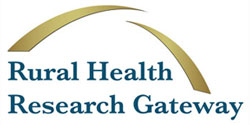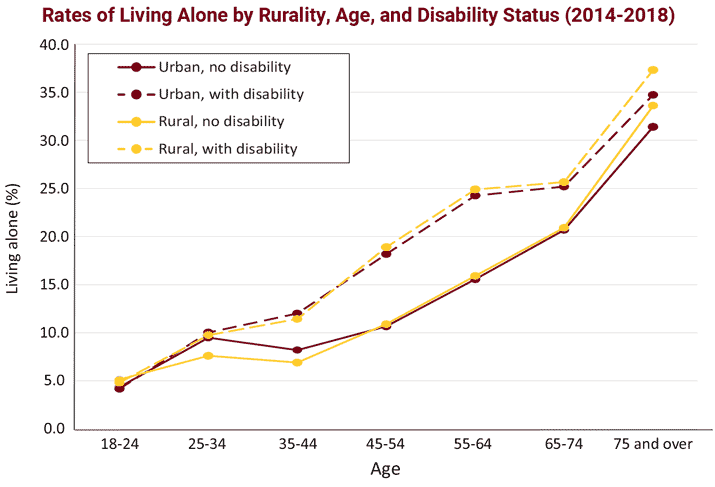Gateway to Rural Health Research
By Jena Pierce on
Healthcare is vitally important to communities throughout the country, and unique characteristics surround rural healthcare, compared to urban counterparts. Decisions regarding healthcare that must be made in communities for hospitals, clinics, public health departments, and schools require data and evidence-based research.
 The
Rural
Health Research Gateway (Gateway) provides easy and
timely access to research conducted by the Rural Health
Research Centers (RHRCs) funded by the Federal Office of
Rural Health Policy (FORHP). Users can freely access
research dating from 1996 to today, all in one convenient
location.
The
Rural
Health Research Gateway (Gateway) provides easy and
timely access to research conducted by the Rural Health
Research Centers (RHRCs) funded by the Federal Office of
Rural Health Policy (FORHP). Users can freely access
research dating from 1996 to today, all in one convenient
location.
Gateway's easy-to-use website offers policymakers, educators, public health employees, hospital staff, rural leaders, academic researchers, and media a valid place to find research and data they can use to shape and mold community needs regarding healthcare. It also utilizes a wide range of tools used to disseminate research to different audiences.

"The primary purpose of Gateway," said Per Ostmo, program director of Gateway, "is to share the work of the FORHP-funded Rural Health Research Centers. These research centers study national rural health issues. We recognize that it can be difficult and time-consuming to find rural-oriented health research."
"Gateway houses the work of these research centers in one place," Ostmo continued, "and we notify anyone interested as soon as we have a new research publication. We do this outreach through social media posts, through our email alert system, and with webinars so that research results are shared efficiently and effectively with diverse audiences."
Need for Rural Health Research
Originally funded in 2006, the Gateway program was quickly developed and the website was launched in February of 2007. The need for providing rural health-based research included finding the differences between rural and urban communities.
Rural and urban areas are quite different when it comes to social determinants of health, healthcare access, and prevalence and incidence of chronic diseases and conditions.
"Rural and urban areas are quite different when it comes to social determinants of health, healthcare access, and prevalence and incidence of chronic diseases and conditions," said Ostmo. "This means that healthcare solutions utilized in urban areas may be a poor fit for rural areas."
Ostmo explained, "The research conducted by the Rural Health Research Centers and disseminated through Gateway highlight these rural/urban disparities so that policymakers, healthcare practitioners, administrators, educators, and other stakeholders are better-informed to care for rural populations."
Gateway has been reawarded funding to continue its work for another five years beginning July 1, 2021 through June 30, 2026.
Web of Resources
The Gateway website is an online library of research and expertise. The website is free to use, searchable, and provides access to the work of the RHRCs and Analysis Initiatives funded by the federal office.
 This online resource of research connects people
to:
This online resource of research connects people
to:
Rural Health Research Centers
The RHRC program, created in 1988, is the only federal program that is dedicated to producing policy-relevant research on healthcare in rural areas. RHRCs examine a wide range of critical issues facing rural communities as they work to secure adequate, affordable, high-quality health services for their residents.
RHRCs' research findings inform a wide audience of decision makers concerned with rural health and have been instrumental in bridging gaps between policy and program needs.
Distinguished McKnight University Professor Katy Backes Kozhimannil, PhD, MPA, at the University of Minnesota Rural Health Research Center, is one of the researchers working with Gateway.
Backes Kozhimannil shared, "Gateway is a place I can refer students, colleagues, legislators, clinicians, community leaders, and others who need to access high-quality rural health research to inform their work. It is an incredibly valuable resource."
Areas of Research Expertise
Gateway, the RHRCs, and FORHP all collaborate closely and frequently. Every year the federal office assigns four research projects to each Center. Projects are assigned based on the specialty area of each Center. For example, healthcare workforce is a specialty area of the Washington, Wyoming, Alaska, Montana, Idaho (WWAMI) RHRC, while maternal health and obstetrics is a specialty area of the University of Minnesota RHRC.
Gateway's website analytics are also used to help select new research projects. Ostmo shared, "We found that a 2014 publication by the North Carolina Rural Health Research and Policy Analysis Center, Discharge to Swing Bed or Skilled Nursing Facility: Who Goes Where? (no longer available online), has been consistently popular for several years. As a result, that Center was recently asked to update that publication as part of a new project."
Importance of Research
If you live in a rural area, then you've probably experienced barriers to healthcare first-hand.
"If you live in a rural area," Ostmo explained, "then you've probably experienced barriers to healthcare first-hand. Facilities are often under-resourced. It may be difficult to schedule an appointment with a healthcare provider. Individuals may need to travel more than an hour to see a specialist."
"However," Ostmo continued, "the majority of American residents reside in urban areas and may not have an intuitive understanding of the challenges surrounding rural healthcare. It's important that these challenges are quantified and presented to key decision makers in a manner that is easy to understand."
Ostmo shared an example of how research can be used to make decisions about elderly rural adults who wish to age in place.
 Source: Demographics
and Disability Status of Adults Living Alone in Rural
Areas (2021). University of Minnesota Rural Health
Research Center.
Source: Demographics
and Disability Status of Adults Living Alone in Rural
Areas (2021). University of Minnesota Rural Health
Research Center.
"Researchers from the University of Minnesota RHRC found that adults living alone in rural areas are more likely to have a disability and to be 75 years old or older, compared to adults living alone in urban areas. This research guides rural stakeholders to make better-informed decisions."
Dissemination Tools
Along with maintaining a website, Gateway uses a number of other methods to share the work being done in betterment of rural communities, including:
- Hosting free webinars highlighting research focused on key rural policy issues, which draw up to 500 live attendees. Webinars are then archived on the Gateway website for users to view at their convenience
- Exhibiting, presenting, and sharing resources at local, state, and national health conferences
- Maintaining a presence on social media utilizing mediums such as Facebook, Twitter, and YouTube
- Collaborating with national organizations and associations to promote research in their newsletters and on their listservs
- Developing one-page research Recaps for general audiences and legislators
- Emailing research alerts to more than 2,700 subscribers once new research has been published
- Providing other technical assistance to the RHRCs
"Publishing is not the endpoint for rural health research," said Backes Kozhimannil. "The endpoint, in my view, is changing things for the better in rural communities by improving health and well-being for people and families. The only pathway to accomplishing real change through research is via dissemination of findings to the people with the power to make a difference for rural residents."
Recent Growth
Pre-COVID-19, Gateway staff would travel to various national rural health conferences to exhibit or present research. During COVID-19, those in-person opportunities stopped as the world moved to a more virtual presence. Despite this, Gateway has consistently grown in reach. The research alerts have more subscribers than ever, and Gateway's social media following has grown by 25% in the past year.
"The research centers are consistently putting out some of their best work ever," said Ostmo. "That being said, in-person events allow for that extra personal touch when it comes to stakeholder engagement, and I am looking forward to getting back to that."
For More Information
- Sign up for Gateway's email alerts
- Follow Gateway on Facebook and Twitter
- Email inquiries are always welcome


 is the communications manager at the Center for Rural
Health at the University of North Dakota School of
Medicine & Health Sciences in Grand Forks.
is the communications manager at the Center for Rural
Health at the University of North Dakota School of
Medicine & Health Sciences in Grand Forks.



